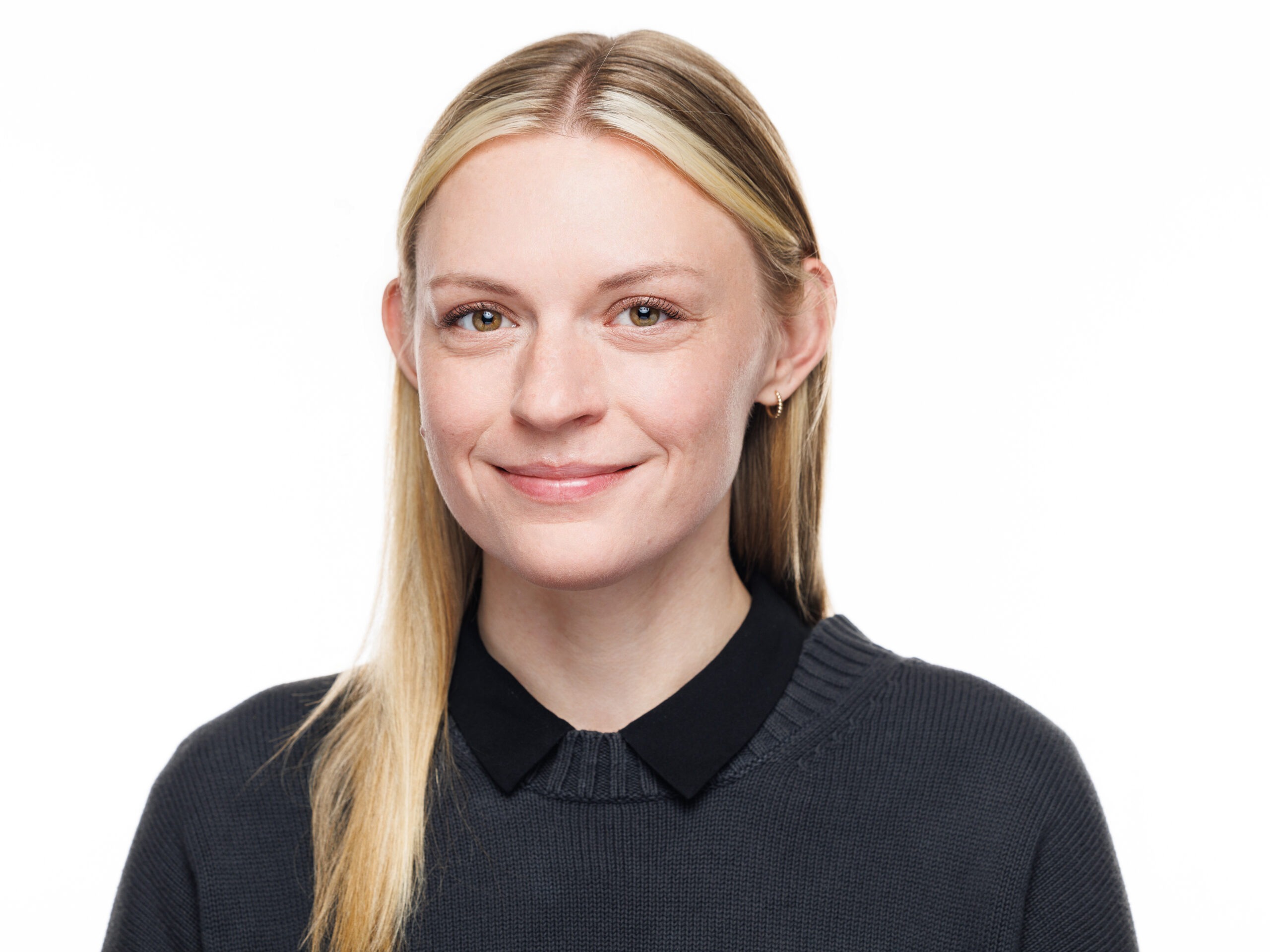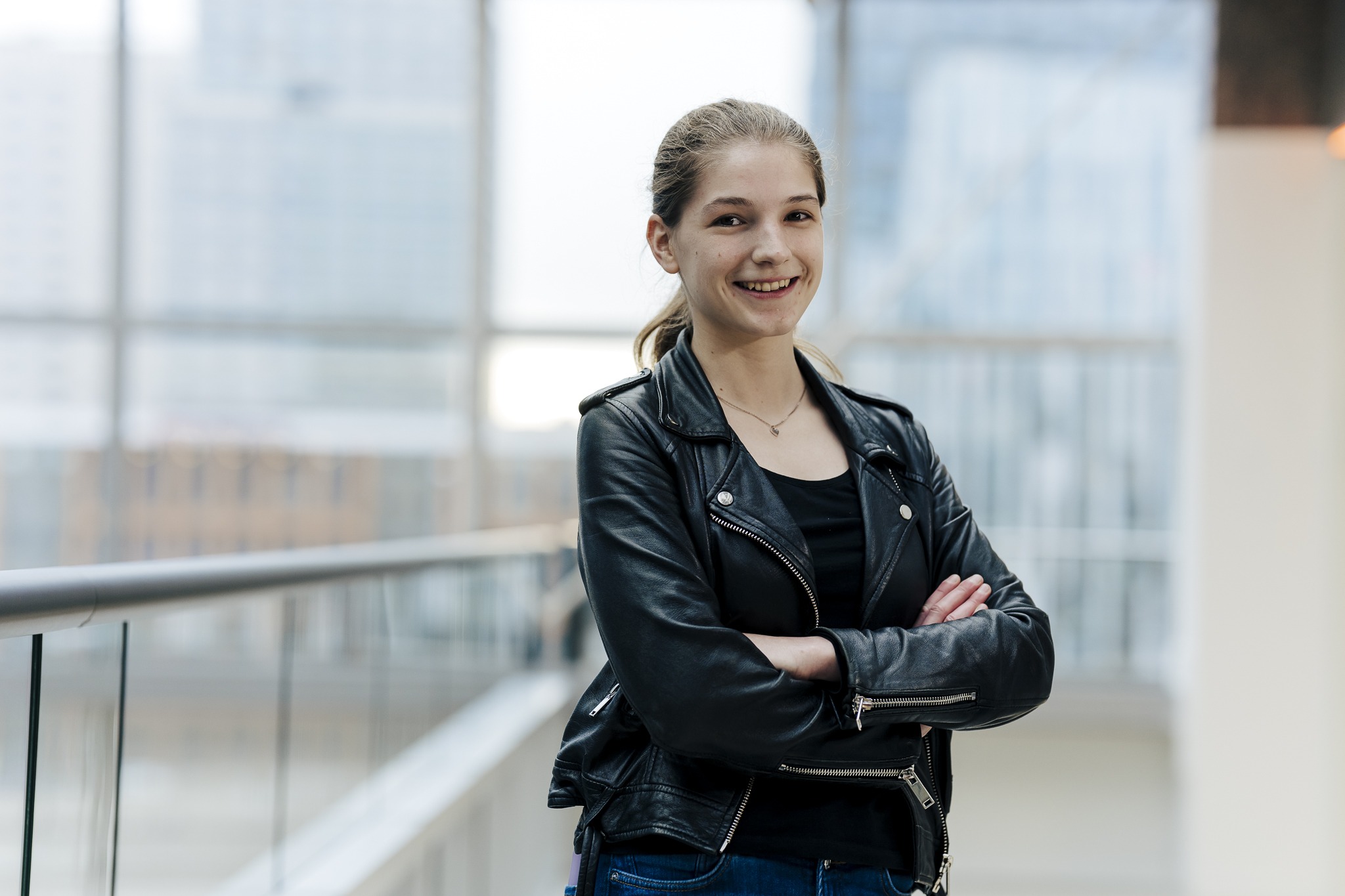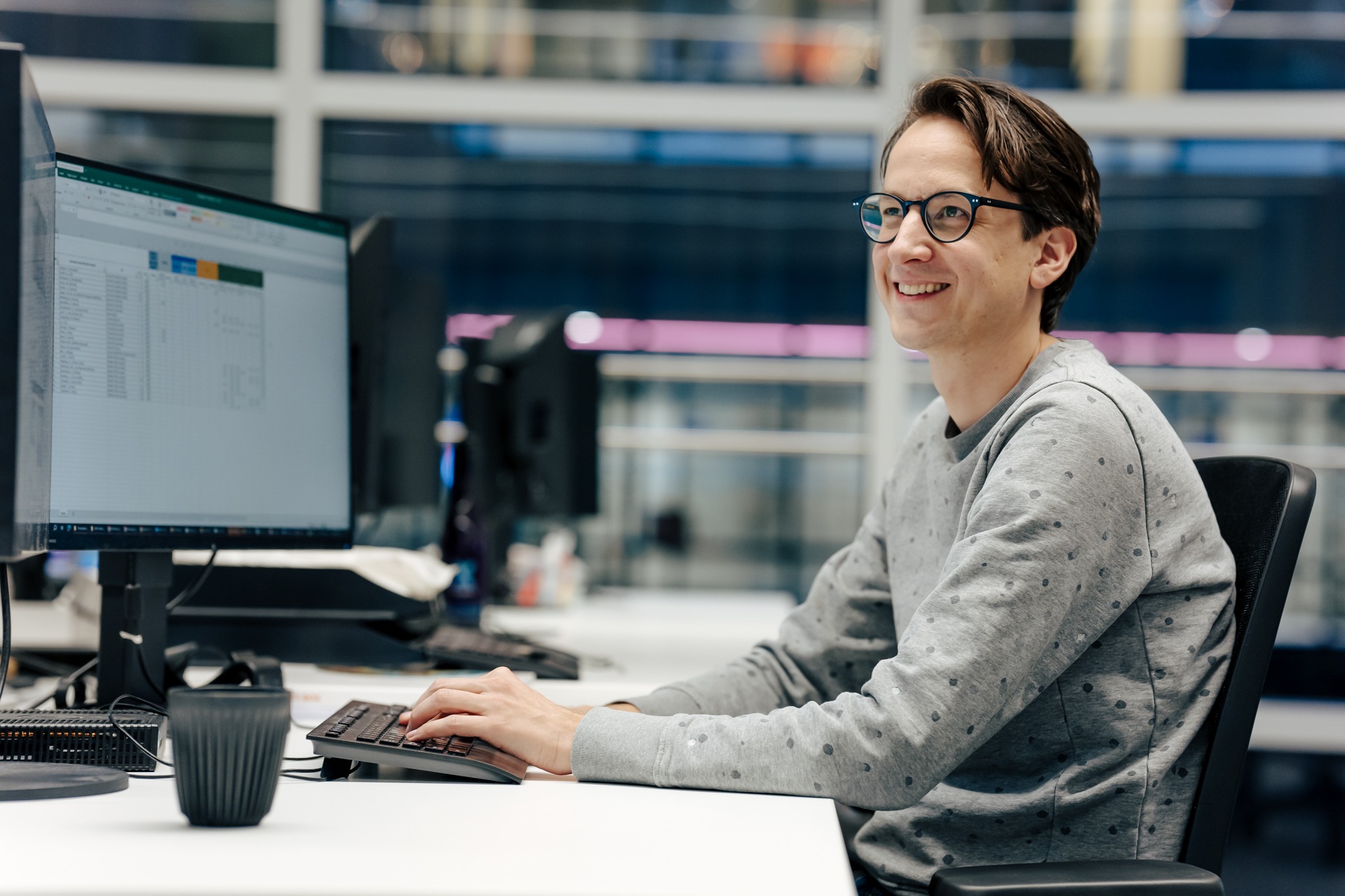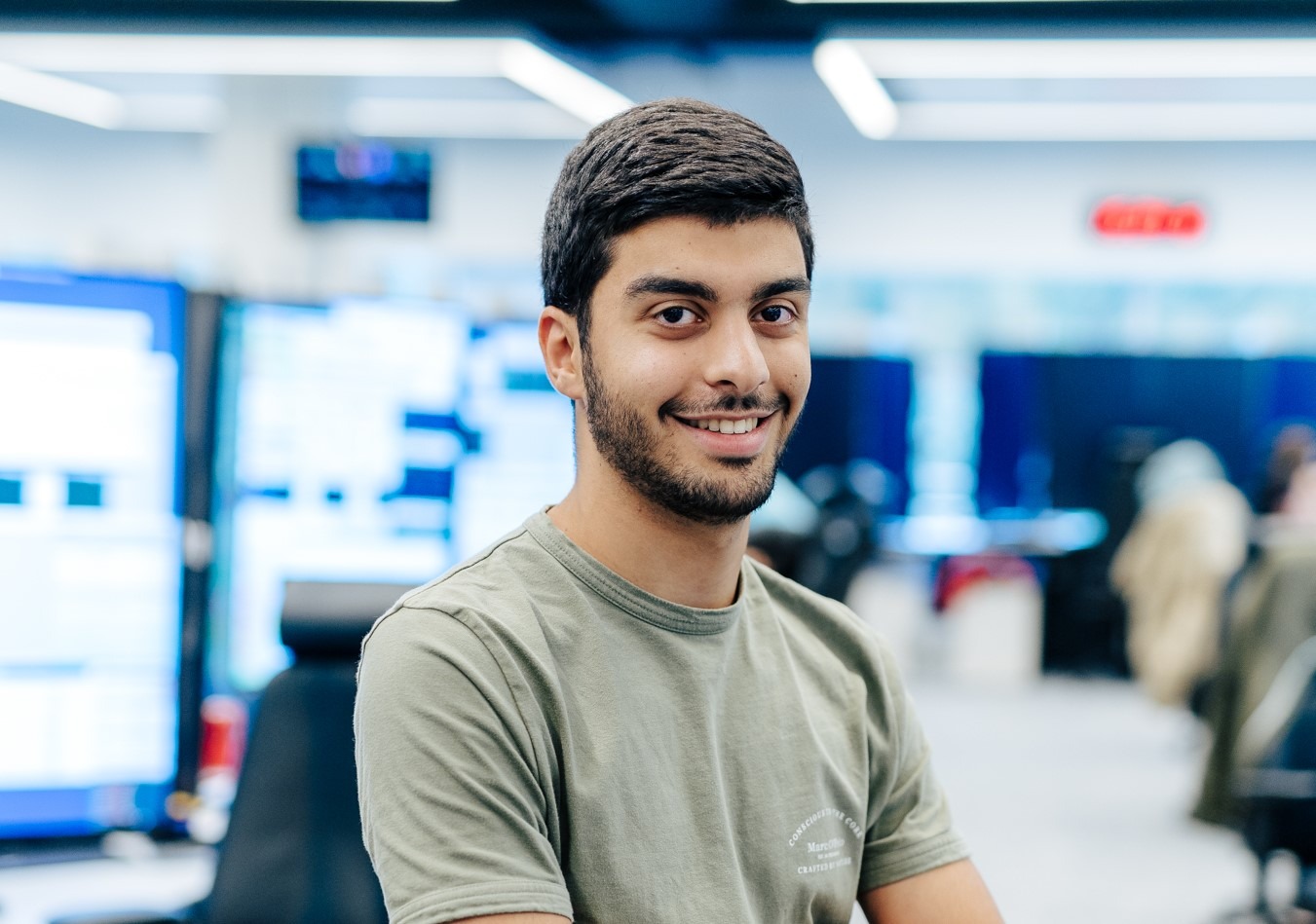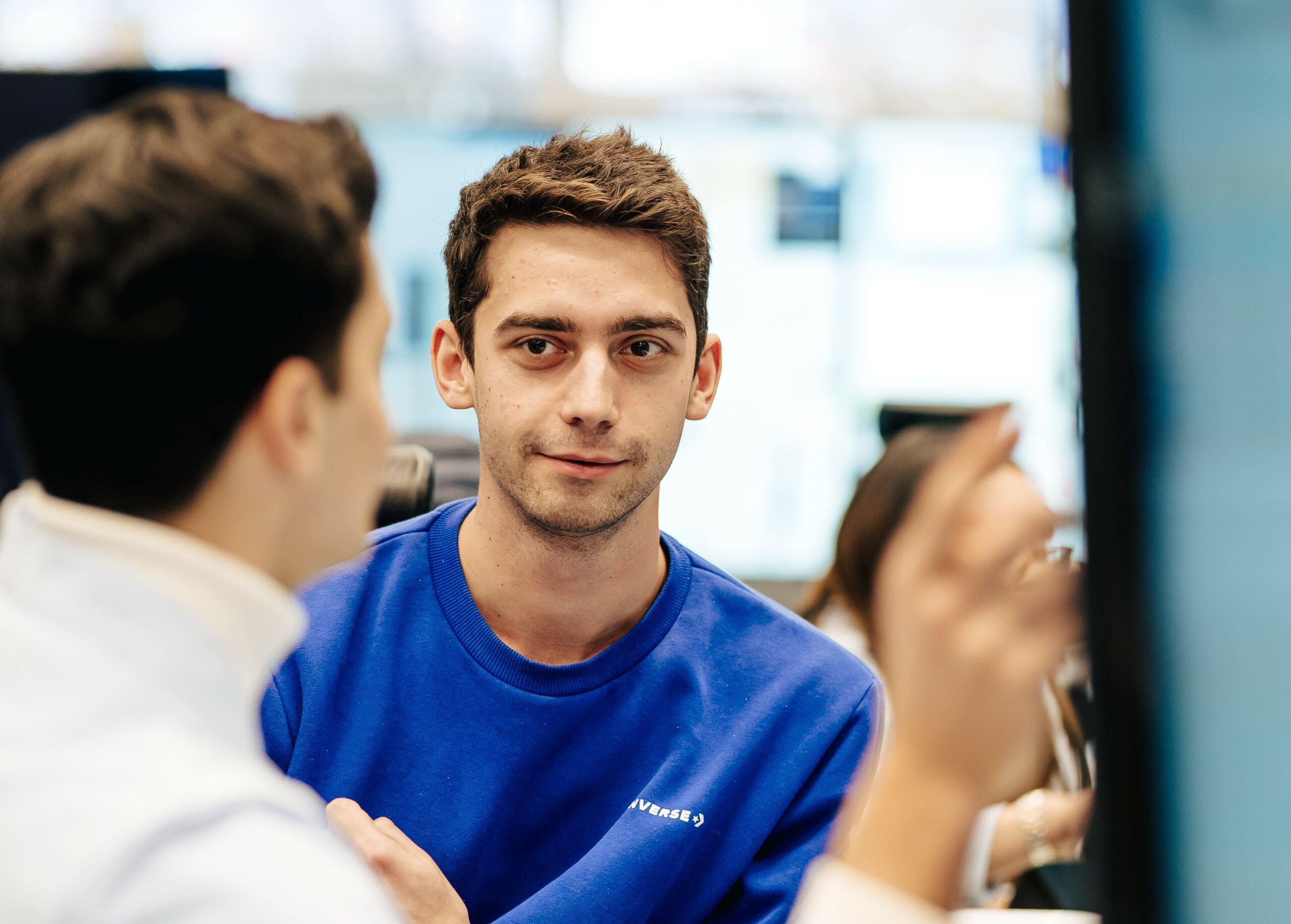Optiver graduate stories: pathways to a career in tech
Nicole
Software Engineer
What first attracted you to join Optiver?
I didn’t know about HFT as a career path until a friend of mine got the opportunity to intern at Optiver. The internship seemed super fun, and the style of work struck me as extremely hands on. The environment is really unique in this industry, you have a high level of responsibility on interesting technical projects that are largely unblocked by red tape. This is because we develop products for use in-house, so you can have an idea and release it for use within the same day. The work environment has also given me a great opportunity to hit the ground running and grow quickly in a wide variety of domains.
What did you study and how is it relevant to your role at Optiver?
I studied computer science with a heavy focus on software engineering. It was quite a good baseline for my role here, both with the fundamental technical skills, and the soft skills around learning quickly and collaborating. You don’t need to come as an expert, the culture here is for us to learn on the job. I had no background in our programming languages (C++ mostly and some Python among others), let alone a background in finance. My technical skills as well had plenty to be desired.
What does your role entail?
I am a developer in our Statistical and Index Arbitrage team. This team works on our position taking strategies that use macro economic trends to predict price moves. This is different to the standard Optiver trading loop where the focus is on making good decisions, as quickly as possible. Building a system like this requires a close collaboration of dev, research and trading know-how, so I get to learn lots about these areas in my work with these tribes.
What are some of the projects you are working on (non-confidential)?
We wear lots of different hats here. I do a fair amount of work in our production environment to deploy new products and improve existing ones for my team. I’m also doing some projects in our backtest/research pipeline. This is the environment our researchers and traders use to test and iterate on strategies. These two areas touch on a wide variety of technical domains and almost every aspect of these domains was foreign to me before joining as a graduate.
What are some of the key skills required for your role?
I think the soft skills are key. Optiver is a highly collaborative environment so things like communication and project management are at the forefront. And as well, this is an environment where you will encounter things you don’t understand every day. Having the mindset to ask for help, and continue learning and tackling these challenges is important. The technical skills come with time and are important as well, and they help you deliver quality projects in a timely manner.
Do you have interests outside of work that help you in your role?
Work life balance is important! My hobbies aren’t technical but they are priorities to me. At the moment I’m doing plenty of running and playing lots of poker 😊.
What do you love about your work?
One of the best parts I’d say is the release of a big project. We are often responsible for the full development cycle of a project from planning, designing, testing, to deploying. Achieving all of that is always a satisfying feeling, and the culture here is pretty big on recognizing and appreciating achievements when they happen. I also like being able to look back on my previous projects, I find it encouraging to see my growth and increased capabilities from the last years of effort put in.
How were you supported to learn during your graduate program?
The learning environment here has been a highlight of my experience. Starting out I got to benefit from the education team who took me through my introduction courses to both options trading and C++. We learned through lectures as well as through hands-on means, such as doing trading games against each other and competing in an autotrader building competition. When I was placed into my dev team, I received lots of direct mentorship and was given projects that built in complexity over time as I became capable of more. There is no lack of mentorship and learning support, and that certainly doesn’t go away as you move into your second year and beyond.
What’s your advice to potential applicants?
Give it a go for sure. I think the application process goes both ways, and it’s a good opportunity to talk to employees here and figure out if Optiver is the right place for you. I’d recommend you to ask lots of questions, and don’t worry if you feel like you don’t know everything up front: I didn’t and still do not!
Brenda
Graduate Software Developer
What first attracted you to Optiver?
I didn’t really know much about Optiver or finance when I first applied. But throughout my internship, I really enjoyed working on the problems and challenges at Optiver, and working with all the amazingly bright people around me.
What does your role entail?
I work in common execution which is a core team that oversees all common products that execute into the various exchanges that we trade. At the start of a project, I’ll mostly be in meetings – discussing, planning and designing efficient, scalable and modular solutions for the particular problem. Most of my development work is in C++, with a sprinkle of Python for latency insensitive tasks or for data analysis. Furthermore, a lot of time is also spent on verifying that our products work, as intended by thoroughly testing our stack and ensuring mechanisms are in place so we can efficiently rollback and operate if something does go wrong.
What key skills are required?
Whilst technical knowledge is important, communication and project management are crucial. No matter which team you end up on, you’ll be interacting and collaborating with a variety of other teams, both technical and non-technical. Knowing how to work efficiently with them, and manage their needs and expectations is important to developing great solutions.
What are some of the projects you are working on (non-confidential)?
One project that I’ve been working on is the rookie environment. In this project, I worked with a team to upgrade the stack that we train the rookie traders on, including the exchange simulator, so that it would better mirror production. Another project I worked on was upgrading our existing order safety system, which we use in case of emergencies to remove ourselves from the market in a quick, efficient, and safe manner.
How do you start your day at Optiver?
I start my day with coffee in the morning from our amazing in-house barista. From there, I check slack and my emails. Then I check that everything is running as normal and there are no problems. At 9:30am, my team has a short stand up where we catch up with our projects. Afterwards, I head upstairs for brekkie and officially start my day 😊.
What do you love about your work?
I love that there are plenty of interesting, dynamic, and challenging problems at Optiver and you’ll never be bored of whatever you are working on. You also get a lot of ownership of the work that you do, and you really feel like you are making a meaningful and impactful contribution at work.
Do you have interests outside of work that help you in your role?
Whilst I do enjoy programming as a hobby and love my data science and enjoy scripting things on the side, I think a good work life balance is important so it’s perfectly fine to keep a distinction between work and your hobbies.
What’s your advice to potential applicants?
No one is across everything and we don’t expect you to know everything when you join. Every day you learn something new at Optiver. Showing that you can learn and improve from your mistakes, and reflect on your past experiences is far more important than knowing everything at a glance!
Marcus
Graduate Software Developer
What first attracted you to Optiver?
I knew about Optiver from a guest lecture at University. I was impressed by the interesting things they presented during that guest lecture. Especially the part how they put effort in reducing latency of the system and how much impact it has by simply choosing the correct data structure. Seeing the knowledge I learnt from Uni being used in a complexed system and having huge impact, got me excited about the trading industry.
I got the chance to know Optiver better through the interview process. It was one of the best designed interviews I had. I really liked the introduction session in between the behaviour and the technical interview. It gave me the chance to talk to new starters, who were grads a few months ago, and know Optiver from their eyes. But my favourite part was the technical design interview. It was challenging, but it felt more like an opportunity to work with senior developers from Optiver and come up with a solution together. We were having discussions about the solution I proposed and where possible improvements can be made. Everyone offered their opinion. I later found out this is how we work here; you can always make your voice heard and be a part of the decision-making process – even as a grad!
What does your role entail?
I got access to the production environment shortly after I started (after completing a basic training session), which meant that I was able to make real impact to our system from the very beginning. At Optiver, we expect developers to take responsibility of their own project, which includes development, testing, deployment and supporting. But there’s always plenty of support you can get from your team and basically everyone in the company. As a grad, I never felt embarrassed to ask basic questions and was never afraid I won’t get an answer. I’m surrounded by talented people with their own specialties – any question you have here will get an answer.
What key skills are required?
We mainly use C++, C# and a bit of Python at Optiver. However I never see this as a requirement. I’ve seen plenty of new starters who haven’t done much coding in those languages picking them up very quicky. We have very well-designed training sessions to help you get familiar with the language and our environment. On top of that, we also have study groups that are designed for developers from different levels to help you learn about new features of the language and how they are being used in our code base.
In my opinion, the only real requirement is your enthusiasm, curiosity to learn new things and ability to face new challenges. Besides coding, we also have lots of exposure to exciting trading knowledge, as well as to the rest of the system outside your team. It’s always exciting for me to learning about new things and cooperating with trading, research and other teams.
What are some of the projects you are working on (non-confidential)?
I did my first 6 months rotation in market facing team and then moved to risk and treasury team. In my new team, I’m working on various capital related projects, such as margin calculation system, cash monitoring system and our risk system. It’s a very exciting area of our business and there’s always new things. Different markets have different requirements and calculations. Being able to understand the requirements and implement them into our system is part of my job. It’s very challenging and rewarding to go from specs to a product, and maintain the quality and scalability or our code base in the meantime.
How do you start your day at Optiver?
Everyone starts their day differently and you don’t have to follow a routine. For me, I normally check my email and slack messages to see if there’s anything urgent that needs to be handled. Then I spend a bit of time planning out my work for the day. I like to have a nice chunk of time to focus on my main project, and leave some time for smaller tasks, meetings, or just a random chat about some irrelevant projects from another team. It’s always good to improve your understanding of other parts of our system and it will pay off very quicky.
What do you love about your work?
Top two things I love about my work is:
- I never get bored, there’s always new challenges and opportunities. There’s always new things to learn if you are interested.
- I’m surrounded by a group of very talented people who are passionate about what they are doing and always happy to share.
What’s your advice to potential applicants?
I think Optiver is a great place to work. I found my passion here, made new friends, learnt priceless knowledge of the industry and moved to the next chapter of my life after University. If you are up for the challenge, you won’t miss your reward.
Victoria
FPGA Developer
What first attracted you to Optiver?
I get to work on new tech – it’s not everywhere (especially in Australia) where you get the chance to work on FPGAs! Optiver was also an opportunity to try something different – I interned at very large global companies so I thought I’d take a shot at somewhere smaller where I could have more impact.
What does your role entail?
Not everyday is the same at Optiver. Usually I’ll be developing new hardware designs or hardware improvements in VHDL and SystemVerilog. But every now and then, I get involved with software changes in C++ and Python, deploying my change to production and handling any incidents that may occur, and working with different teams on project requirements, specs, and designs.
What are some of the projects you are working on (non-confidential)?
My projects are normally centred around latency improvements in our competitive stacks. Examples include implementing our TCP stack in hardware from scratch and parsing market data into signals that can be interpreted by our trading strategies.
I’m also passionate about learning so I created a “Hardware Study Group” with my team where we have a rotation of topics and presenters. We have two groups within the team and spend an hour each month diving into a different topic.
What do you love about your work?
It’s pretty rare that you can work somewhere where you really own your project/product. Even as a graduate you’ll get the opportunity to be part of all stages of your project – from planning to development to testing to deployment. As you progress in your career, you can have even more impact on the projects you work on.
Do you have interests outside of work that help you in your role?
Outside of work, I play double bass for a small community orchestra and go climbing every week. I even set up a Slack channel to organise climbing with my colleagues. We usually rotate between bouldering and top roping then head out for dinner afterwards. I also attend various tech meetups in the evenings.
What’s your advice to potential applicants?
Research the company you are applying for and think about why you want to work there ahead of time.
Study for your interviews – practise coding questions online and with friends and get used to thinking out loud and explaining your code and thought process. Have your own questions ready – the interview is a two-way process and you want to be sure that this is the right place for you.
Richard
Graduate Software Developer
What first attracted you to Optiver?
I first heard about Optiver from a friend who had interned here. They had nothing but good things to say about their experience, and some of the things they got to work on really impressed me. Optiver is the sort of place that gives their people a lot of trust and autonomy, which is something that can unfortunately be quite rare at other companies.
The projects and tasks also seemed to be unique and technically interesting – there are very few places in the world where you’ll get to work on ultra-low-level code or manage a machine learning cluster, let alone be able to do both, at the level of a graduate or intern.
What does your role entail?
I work in our Delta 1 team, which works across markets to develop and build our autotraders, data pipelines, research tools, and pretty much whatever else we need to be successful. I get to wear a lot of hats and touch a lot of different systems with different requirements, which I really value. One day I could be working on enabling part of our autotrading strategy in C++, the next, our backtesting and data pipelines in python.
The Delta 1 team is what some people informally call a core team. This means that we work on a product or set of products that work across markets, and focus on making that scale, so we can develop one autotrader, but trade many products and markets. This is opposed to our market facing squads, which focus on a few markets, and takes care to make sure our products adjust to the specific quirks of each market. Sometimes there’s a bit of overlap, like during a recent Osaka securities exchange upgrade, I was working very closely with the Japan IT team to test our Delta 1 products with the changes that the exchange was making.
What key skills are required?
I’d say above all, the mindset that you come in with each day is the most important thing by far.
The reality of working in such a complicated, technical environment is that there’s always going to be things you don’t understand or know. Add on the fact that there’s a lot of trust and ownership given to you right away here, it’s super important to be able to reach out for help and to be constantly learning. Otherwise, having some technical chops and a reasonable understanding of finance will help, though the latter is not essential when first starting.
What are some of the projects you are working on (non-confidential)?
One of the great advantages of working for a core team is that I get to work on a really diverse set of projects. In my short time here, I’ve touched projects as low level as compiler theory, prepared our products for a large exchange upgrade, and worked with our backtesting cluster which utilises thousands of CPUs.
How do you start your day at Optiver?
When I’m in the office, I like to head up to our level 7 kitchen and grab a nice breakfast. Then, I’ll head down to my desk and catch up on the latest news, email, and slack before getting right into the swing of things. I’m most productive in the morning, so I like to hunker down and get things done, before I have stand up at 11:30. Afterwards, if we’re in the office, I might grab a coffee or tea with the team, then get some PR reviews done, or have a chat with a trader, before I grab lunch.
What do you love about your work?
I love that I work in an environment full of smart, driven people. It’s like having a team of the best people in your uni projects, except you get to work with them all the time, instead of just a semester.
People are proactive, and always willing to help you out or explain things to you. I don’t think there’s been a single day so far where I haven’t learnt something new.
Aside from the people, the nature of the work is really great. I get to work on intellectually stimulating puzzles that often have a direct impact on the organisation, which really gets me fired up.
What keeps you motivated?
Optiver has a very fast feedback loop because our “clients” are either sitting next to us, or just downstairs from us. This means it’s super easy to see the tangible impacts that you’re having, which I find really gratifying.
Being in an environment where people place a lot of trust in me also motivates me to try and do the best I can. Everybody wants you to succeed, so you can’t help but want to rise to and exceed those expectations!
Do you have interests outside of work that help you in your role?
I have some interest in finance in general which really helped (and continues to help) with my understanding of what we’re doing and why we’re doing it. I also used to work with a few student clubs when I was in university, which I think has helped give me experience communicating with stakeholders and balancing needs/requirements from people.
What’s your advice to potential applicants?
Take the time to understand Optiver, what we do, and bring your real self to the interviews. We want to find out if you’ll be a good fit for us, as much as we want to find out if we’ll be a good fit for you.
Other than that, my advice is: apply, or get in touch! I think Optiver’s a great place to work, and I hope you will too.
Lena
Platform Engineer
What first attracted you to Optiver?
Optiver has a great reputation within the CSE community at my university and has a big campus presence as well. So when I found out they were hiring graduates for an operations role, I applied straight away!
What does your role entail?
My team is responsible for building the tooling and systems that enable our trading environment to run smoothly. This involves handling scheduling & orchestration, service discovery, configuration management, CI/CD, and the developer experience. We also take some time each week to do an incident response shift – this gives us a good feel for the pain points in the environment.
What key skills are required?
Apart from the technical skills (knowledge of a programming language, a familiarity with Linux and networking concepts etc.), I would say the biggest skills needed are creativity and an ability to work autonomously. The problems we solve on a day-to-day basis require you to come up with, test and iterate on solutions quickly. And as with almost any role – communication. Optiver has a flat structure and you’ll often be the one driving your own projects from start to finish – which means keeping stakeholders up to date on progress and working with others when the project branches outside your area of expertise. Communication is especially important for incident response as you need to ensure everyone is aware of the impact of an incident, and that the right people have received the information required to resolve it.
What are some of the projects you are working on?
My team and I have recently rolled out a new control system for managing application in our environment that includes both a web interface as well as a command line one. There has been a lot of positive feedback from users, and we are actively working on adding features and improving the user experience. I’ve also been working on streamlining our build and deployment process such that developers can spend less time waiting for their changes to be released into production.
How do you start your day at Optiver?
When I’m in the office I’ll usually start by making myself a cup of tea, and catching up on emails and messages before I jump into my daily stand-up meeting.
What do you love about your work?
I love the variety of the work I can pursue, as it keeps me from stagnating in my learning or getting bored – I’ve done everything from front end development to configuration management to writing C++ and architecting deployment solutions.
I’m also a huge fan of the self-driven nature of projects at Optiver. I get to prioritise what I think is most impactful. We also have a great system of writing up project proposals for the team’s consideration, which encourages everyone to contribute to the direction of the team.
What keeps you motivated?
I personally really enjoy releasing features to developers and traders, allowing them to use the environment in a better, more efficient way. They are always very grateful and give thorough and useful feedback.
Do you have interests outside of work that help you in your role?
I have some technical personal projects on the side that I will pick up now and then, but I think my hobbies of martial arts and bouldering are probably more useful in this regard! It can be easy to lose balance in your life when you work a desk job, so I like to make sure I’m keeping my body healthy as well as my mind.
What’s your advice to potential applicants?
Make sure you’re confident and motivated. Everyone I know at Optiver is always open to learning something new, can comfortably admit when they’re out of their depth and is excited to try new things and challenge themselves. I think this kind of attitude is what leads to success in the technical space because you don’t shy away from learning experiences!
